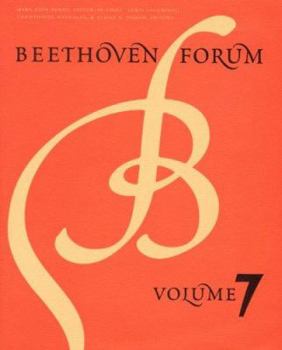Beethoven Forum, Volume 7
The essays in this volume grew out of an international Beethoven conference held in honor of Lewis Lockwood at Harvard University in 1996. Michelle Fillion's opening essay explores the Mass in C and its turn away from the "heroic" style of the "middle-period" works. In "Beethoven and the Aesthetic State," Karol Berger reflects on the manner in which the composer's music often shifts back and forth between a "real" and an "imagined" world. William Drabkin examines the role of the cello part in Beethoven's late quartets, particularly in regard to the elusive parameter of texture. Richard Kramer's reading of the song Resignation (1818) opens new perspectives on the idea of a "late" style in the composer's output. In "Beethoven's 'Expressive' Markings," Leo Treitler demonstrates how seemingly straightforward directions to performers about tempo, mood, or dynamics raise fundamental questions about the relationship between music and language. Michael C. Tusa reviews more than a century of attempts to relate form and content in the last movement of the Ninth Symphony and offers a new interpretation on the idea of the choral finale as a kind of four-movement symphony in its own right. Maynard Solomon's essay on the "Diabelli" variations argues that the theme itself, although simple, is by no means trivial and indeed is "perfectly suited to unpacking issues of firstness and lastness and their interchangeability." William Drabkin concludes the volume with a review essay on Beethoven: Interpretationen seiner Werke , edited by Albrecht Riethm?ller, Carl Dahlhaus, and Alexander Ringer.
Format:Hardcover
Language:English
ISBN:0803212925
ISBN13:9780803212923
Release Date:January 1999
Publisher:Unp - Nebraska
Length:172 Pages
Weight:1.66 lbs.
Dimensions:0.8" x 8.5" x 10.7"
Customer Reviews
0 rating





